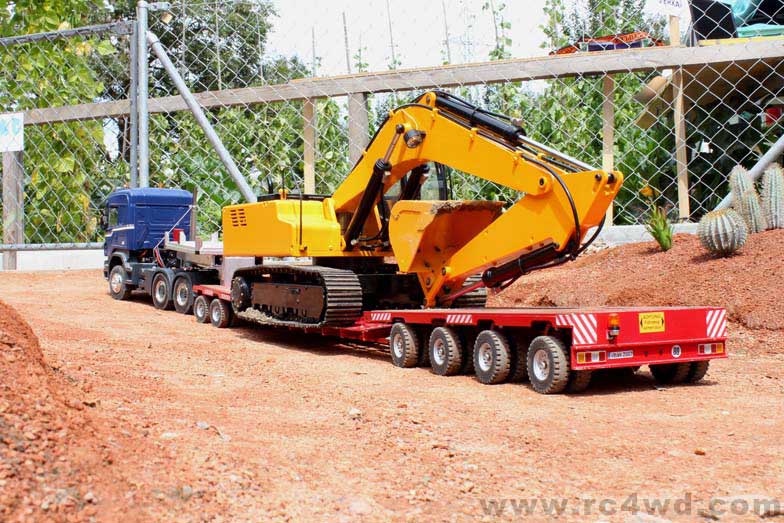Understanding Exactly How Excavator Works and Its Influence On Performance
Excavators play an important duty in building and construction and mining operations, counting on an intricate interaction of mechanical and hydraulic systems. Their capacity to execute a variety of tasks pivots on both their layout and the modern technology incorporated within. Comprehending these elements can substantially influence functional effectiveness and performance. As innovations remain to improve the sector, one must think about exactly how these modifications will certainly affect future techniques and efficiency.
The Essentials of Excavator Mechanics

The Function of Hydraulic Systems in Excavators
At the heart of excavator procedure exists the hydraulic system, which plays a pivotal duty in powering the machine's motions and functions. This system uses pressurized hydraulic liquid to move energy, allowing various activities such as excavating, training, and moving. By taking advantage of the concepts of hydraulics, excavators can execute jobs with amazing precision and force, enhancing total operational efficiency.The hydraulic system contains crucial parts, consisting of shutoffs, cyndrical tubes, and pumps, which interact to manage the flow and instructions of the fluid. When the operator engages the controls, the hydraulic liquid is routed to certain cyndrical tubes, translating the driver's commands right into physical activity. This mechanism enables receptive and smooth activities, which are essential in construction and excavation environments. double e volvo rc excavator. The effectiveness of the hydraulic system directly impacts the efficiency and flexibility of the excavator, making it an essential aspect in modern excavation processes
Key Components of an Excavator
Understanding the key components of an excavator is essential for grasping just how this effective equipment runs. An excavator contains a number of significant components, consisting of the undercarriage, home, boom, container, and arm. The undercarriage provides security and movement, often including tracks or wheels to browse various terrains. Your home has the engine and hydraulic systems, permitting the driver to control movement and power the machine. The boom prolongs from your home, allowing vertical reach, while the arm connects to the pail, promoting excavating and training operations.Additionally, the cab houses the driver, geared up with controls for exact handling. Each of these elements plays a vital function in the excavator's total capability, adding to its efficiency and performance on building and construction sites. Comprehending these components aids in optimizing and preserving excavator performance, guaranteeing jobs are finished securely and efficiently.
Add-on Flexibility and Its Advantages
Attachment adaptability is a vital aspect of excavators, enabling operators to change between different devices tailored for details tasks. This adaptability not only boosts job effectiveness yet also adds to cost-effectiveness by minimizing the need for multiple makers. Comprehending the various sorts of attachments offered can considerably influence the total performance and performance of an excavator on task sites.
Kinds of Accessories
While excavators are mainly recognized for their digging abilities, their real convenience depends on the broad range of accessories readily available. These attachments enhance the excavator's capability, enabling it to carry out different tasks beyond excavation. Typical accessories consist of containers (for digging and scooping), hydraulic thumbs (for comprehending materials), and augers (for drilling holes) Grapples are used for taking care of and moving debris, while rippers can separate difficult surface areas. Other specialized attachments, such as plates and rakes, make it possible for excavators to adjust to certain task requirements. This variety not only boosts the machine's energy throughout different fields, including landscaping, demolition, and construction, yet additionally enables operators to tailor their tools to fulfill details job needs successfully.
Increased Task Efficiency
Maximizing job performance is a key benefit of making use of numerous excavator add-ons. Different add-ons allow an excavator to carry out multiple jobs without needing to switch over equipment, conserving important time and labor. Using a hydraulic hammer can damage concrete while a bucket add-on can excavate dirt, enabling a seamless operations. This flexibility lowers downtime associated with equipment changes and boosts productivity on-site. In addition, specialized attachments enhance accuracy in jobs such as grading or landscaping, leading to higher high quality end results. The capacity to adjust to various job needs not just enhances procedures but likewise lessens the demand for additional machinery, making sure that tasks are completed swiftly and efficiently. In general, attachment flexibility substantially adds to increased task performance in excavation job.
Cost-Effectiveness and Versatility
Cost-effectiveness is a significant advantage of making use of flexible excavator attachments. These add-ons allow a solitary excavator to execute numerous jobs, decreasing the requirement for extra machinery and labor - double e volvo rc excavator. By switching in between buckets, hammers, and grapples, operators can tackle various tasks, from excavating to demolition, therefore maximizing devices use. This adaptability not only decreases functional prices however likewise reduces downtime connected with changing tools. Furthermore, the capacity to customize excavators with specialized attachments boosts efficiency, as they can efficiently take care of diverse jobs according to project demands. To conclude, the mix of cost-effectiveness and flexibility in excavator accessories adds to improved functional efficiency and resource appropriation in building and construction site web and excavation jobs

Advanced Modern Technology in Modern Excavators
Modern excavators are progressively outfitted with advanced innovation that changes excavation procedures. Automation simplifies operations, while improved gas effectiveness decreases functional expenses. Furthermore, smart control systems enhance accuracy and safety and security, noting a substantial development in excavation tools.
Automation in Excavation Processes
As excavation modern technology develops, automation has become an important part in boosting efficiency and precision on task sites. Modern excavators are geared up with innovative automated systems that assist in tasks such as grading, excavating, and trenching with very little driver treatment. These systems utilize sensing units, GPS, and device knowing formulas to ensure accurate positioning and depth control, greatly reducing the margin for mistake. Additionally, automation permits operators to concentrate on tactical decision-making as opposed to manual controls, resulting in boosted efficiency on the whole. Such developments not just streamline operations but additionally enhance safety and security by reducing human error in intricate procedures. The assimilation of automation in excavation procedures represents a considerable development in building modern technology, driving the industry towards higher effectiveness and performance.
Enhanced Fuel Effectiveness
Improvements in modern technology have also led to significant enhancements in gas efficiency for contemporary excavators. Modern makers are equipped with advanced engines that optimize power output while decreasing fuel consumption. These engines use cutting-edge burning technologies, such as turbocharging and direct fuel injection, to improve performance and effectiveness. Furthermore, lightweight materials in building decrease overall weight, permitting less power expense during procedure. The introduction of variable speed controls allows operators to adjust engine performance according to specific tasks, further decreasing gas usage. Therefore, these enhancements not just lower operational prices however likewise add to environmental sustainability by decreasing discharges. On the whole, boosted fuel effectiveness in excavators is a crucial advancement that reinforces efficiency and economic viability click to find out more in the building sector.
Smart Control Solution
While operators browse significantly complicated work websites, wise control systems in excavators have actually emerged as necessary devices for improving efficiency and precision. These innovative modern technologies make use of sensors and algorithms to keep track of numerous specifications such as tons weight, surface problems, and operational performance. By automatically changing hydraulic features, clever systems maximize machine efficiency, causing boosted efficiency and reduced endure parts. Furthermore, operators take advantage of instinctive interfaces that supply real-time comments and diagnostics, enabling for informed decision-making. This combination of innovation not just improves operations but likewise minimizes human error, adding to safer work settings. As the construction industry remains to develop, wise control systems will play an essential function in shaping the future of excavator effectiveness and efficiency.
Enhancing Operational Performance With Excavators
Excavators play an important role in improving operational effectiveness across numerous building and excavation projects. Their versatility enables multiple jobs, consisting of product, excavating, and training handling, which simplifies workflows and decreases the requirement for extra tools. With effective hydraulic systems, excavators can perform durable jobs with accuracy, considerably reducing the moment called for to total projects. The combination of advanced modern technology, such as GPS and automated controls, better enhances their procedure, enabling drivers to achieve better precision and decrease product waste. Additionally, modern-day excavators are developed to take in less gas and reduce discharges, adding to both expense savings and environmental sustainability. By making use of excavators efficiently, construction teams can improve performance, satisfy project target dates, and enhance overall site management. This multifunctionality and efficiency make excavators essential tools in the contemporary construction landscape.
The Future of Excavators in Building and Mining Industries
As the building and mining markets advance, the future of excavators is poised for substantial change driven by technological technology and transforming operational needs. Advancements in automation and expert system are improving excavator capacities, permitting boosted precision and effectiveness in operations. Independent excavators are arising, decreasing the need for human intervention and reducing the risk of accidents.Moreover, the integration of telematics and IoT modern technology makes it possible for real-time surveillance of machine performance and anticipating maintenance, maximizing uptime. Eco-friendly styles, consisting of electric and hybrid versions, are obtaining grip, straightening with sustainability goals within the industry.Additionally, using sophisticated products and lighter layouts enhances fuel performance while preserving performance standards. As these fads development, excavators will play a vital duty in meeting the enhancing needs for productivity and safety and security in building and mining, ultimately changing functional landscapes.
Regularly Asked Questions
Just How Do Weather Influence Excavator Performance?

Climate condition considerably affect excavator efficiency, as rainfall and mud can prevent traction and stability, while severe temperature levels may influence hydraulic systems. Operators must adjust to these variables to ensure ideal capability and security during operations.
What Precaution Should Operators Adhere To While Utilizing Excavators?
Precaution for excavator drivers include using ideal individual safety devices, carrying out pre-operation inspections, making certain proper communication with ground personnel, maintaining a secure range from overhead hazards, and sticking to well established operational protocols to stop crashes.
Just How Often Should Excavators Be Kept for Optimum Efficiency?
Excavators should be preserved on a regular basis to assure peak efficiency, commonly every 250 operating hours or as defined by the producer. Routine checks enhance reliability, stop unforeseen malfunctions, and visit this page prolong the life expectancy of the tools.
What Is the Average Life Expectancy of an Excavator?
The average life-span of an excavator commonly varies from 10,000 to 15,000 hours of procedure. Aspects influencing longevity include upkeep techniques, operating conditions, and the high quality of the equipment itself, affecting overall performance and effectiveness.

Can Excavators Operate Irregular Surface Properly?
Excavators can operate properly on irregular terrain due to their expressed designs and flexible tracks. These features permit them to preserve security and traction, making it possible for effective procedure in challenging environments generally come across in building and landscaping tasks. Each of these parts plays an important function in the excavator's total performance, contributing to its efficiency and efficiency on construction sites. Taking full advantage of job efficiency is a key advantage of using various excavator accessories. While operators browse progressively intricate job sites, clever control systems in excavators have actually emerged as crucial devices for improving performance and accuracy. Excavators play an essential duty in improving functional performance throughout numerous building and construction and excavation jobs. Developments in automation and man-made knowledge are improving excavator capacities, allowing for enhanced accuracy and efficiency in procedures.